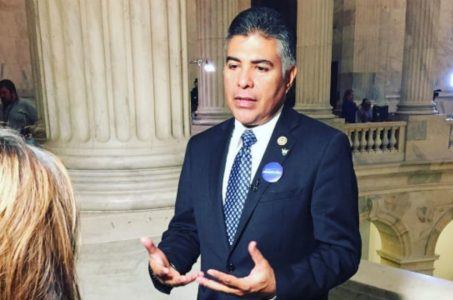Lawmakers File Bill in Congress to Phase Out US Greyhound Racing Industry
Posted on: May 20, 2021, 09:15h.
Last updated on: May 20, 2021, 12:33h.
A bipartisan group of US House members have filed legislation that would ban greyhound racing and would amend the Wire Act to eliminate betting markets for the sport.

US Rep. Tony Cárdenas (D-Calif.) sponsors the bill, called The Greyhound Protection Act. He joins with US Reps. Mike Waltz (R-Florida), Steve Cohen (D-Ten.), Elvira Salazar (R-Florida), Stephanie Murphy (D-Florida), and Brian Fitzpatrick (R-Pennsylvania) cosponsoring.
It’s the second straight year Cárdenas has filed a bill against greyhound racing. In a statement, he called out the cruelty of the racing industry. Not only are the dogs kept in pens nearly all day, but Cárdenas also added training tactics that can be vicious.
The text of this year’s bill was not published as of Thursday morning. A release from Animal Wellness Action said the new bill would “phase out” commercial racing and would ban the use of live animals, such as rabbits, to train greyhounds.
“My bipartisan bill allows for a sensible wind-down of an already-declining industry that will ultimately outlaw greyhound racing,” he said. “As a longtime animal welfare advocate, I am always committed to always speaking up for the voiceless.”
Just Four Tracks Left
According to GREY2K USA, an anti-racing organization, dog racing is illegal in 41 states. Last year, tracks in Alabama and Texas closed.
There are only four tracks currently open. Southland Park in West Memphis, Ark., and the Iowa Greyhound Park in Dubuque, Iowa are phasing out operations.
When they close, it’ll leave just the Tri-State Greyhound Park at Mardi Gras Casino and Resort in Cross Lanes, W. Va., and Wheeling Island Hotel Casino Racetrack in Wheeling, W. Va., as the only properties still running.
A quarter-century ago, there were 60 greyhound tracks in the US.
Greyhound racing has become exceedingly unpopular with Americans and is in a death spiral,” said Wayne Pacelle, president of Animal Wellness Action and the Center for a Humane Economy in a statement.
However, GREY2K USA said that despite the rapid closure of most tracks, there are still as many as 18 states that allow simulcast wagering on greyhound races.
The bill would also amend the Wire Act to include a prohibition on using wire communication devices to make wagers on greyhound races across state lines.
Greyhound Racing Booming in West Virginia
Greyhound racing may be a dying industry, but according to the National Greyhound Association, it’s doing a robust business in West Virginia.
In February, Wheeling Island posted the first $1 million daily handle in the track’s 45-year history. Through May 8, the association said the track has topped seven figures 19 additional times.
On May 1, Wheeling Island reported a $1.38 million handle. That missed setting a national record for greyhound racing – posted nearly 30 years ago – by less than $73,000.
Wheeling Island and Tri-State reported a combined handle of $124 million in 2019. Through the first three months of 2021, the two tracks reported $80 million.
Just as the push to ban greyhound racing nationally has bipartisan support, the push to support it in West Virginia is also bipartisan.
“This significant increase in revenue has put West Virginia in a unique position – to not only ensure that the racers are cared for, but that the hundreds of jobs within the industry are filled by those who want to ensure the credibility and its long-standing tradition of quality,” Senate Majority Whip Ryan Weld (R-Wellsburg) told the association.
House Minority Whip Shawn Fluharty (D-Wheeling) agreed.
“The increase in revenue further proves that our local legislators were correct in our analysis that the industry remains an economic driver for the Northern Panhandle and the state,” he told the association.
Passage This Session Seems Unlikely
The Greyhound Protection Act likely faces long odds for passage. That’s not meant as a critique of the bill, but just the reality of Capitol Hill. Representatives and Senators file hundreds of bills during each two-year session, and only a few make it into law.
Last year’s bill never made it out of the House Judiciary Committee. In addition, it ended the session with just 15 cosponsors out of 435 members.
For perspective, the Horseracing Integrity Act had been proposed in each session beginning in 2015 by US Reps. Andy Barr (R-Kentucky) and Paul Tonko (D-New York). The bill called for nationalized drug standards in the sport.
However, it took the rash of equine deaths at Santa Anita in 2019 to raise awareness of the issue and generate enough support – more than half of the House members signed on as cosponsors – to get it passed through the House last year. And that happened after then-Senate Majority Leader Mitch McConnell (R-Kentucky) announced his support for the legislation. That bill, the Horseracing Integrity and Safety Act, was eventually added to a spending bill in the session’s final days, and finally became law.
However, animal welfare advocates remain optimistic about the greyhound bill’s chances.
“Dog racing is cruel from start to finish,” noted Christine A. Dorchak, president and general counsel of GREY2K USA. “This is an antiquated industry with a compulsion for cruelty.”
Related News Articles
Bill to Kill West Virginia Greyhound Racing Fund Dies in Senate
Federal Bill Would End Greyhound Racing in America
Greyhound Protection Act Would End Dog Racing in West Virginia
Most Popular
Las Vegas Overstated F1 Race’s Vegas Impact — Report
Vegas Strip Clubs Wrestle in Court Over Animal Names
Most Commented
-
End of the Line for Las Vegas Monorail
— April 5, 2024 — 90 Comments -
Mega Millions Reportedly Mulling Substantial Ticket Price Increase
— April 16, 2024 — 6 Comments -
Long Island Casino Opponents Love New York Licensing Delays
— March 27, 2024 — 5 Comments -
Nearly Abandoned Mall Outside Vegas Soon to Have Only One Tenant
— March 12, 2024 — 5 Comments
















Last Comments ( 4 )
I knew greyhound kennel owners and let me tell you they are the dirtiest scumbaggers that I've ever met in the world. They are grandfathered into those tracks . If they didn't have a way to beat the drug test ,do you think they would get caught drugging them once in a while?
I worked at Flagler Dog Track in the late 70's at the height of greyhound racing. Granted, I didn't see everything behind the scenes, but I never saw a greyhound mistreated. On the contrary, we treated all the greyhounds like they were our own personal pets.
Horses are whipped and stay in stalls a lot. Quit picking on just greyhounds. They are cared for well. Better than many animals.
Leave the dogs alone we want greyhound racing it’s back booming . Greyhounds love to run stop the nonsense go bother other industries.. we will always fight to keep the great spot alive